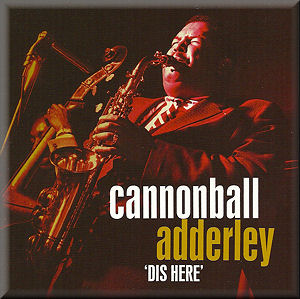CD1
1. Spontaneous Combustion
2. Still Talkin' To Ya
3. A Little Taste
4. Caribbean Cutie
5. Flamingo
6. The Song Is You
7. Cynthia's In Love
8. Cannonball
9. You'd Be So Nice To Come Home To
10. Street Of Dreams
11. Falling In Love With Love
12. You Are Too Beautiful
13. Polka Dots and Moonbeams
14. The Masquerade Is Over
15. I've Never Been In Love Before
16. Little Girl Blue
17. I'm Glad There's You
CD2
1. Spectacular
2. Miss Jackie's Delight
3. Tribute To Brownie
4. Lover Man
5. A Foggy Day
6. Jeanie
7. The Way You Look Tonight
8. Another Kind Of Soul
9. Spring Is Here
10. That Funky Train
11. Jubilation
12. What's New?
13. If I Love Again
14. I'll Remember April
15. Fuller Bop Man
16. Stay On It
17. Love For Sale
CD3
1. Autumn Leaves
2. Somethin' Else
3. One For Daddy-O
4. Dancing In The Dark
5. Blue Funk
6. Minority
7. Nardis
8. Straight Life
9. A Little Taste
10. Jump For Joy
11. Blues Oriental
12. Serves Me Right
13. Groovin' High
CD4
1. Things Are Getting Better
2. The Sidewalks Of New York
3. Sounds For Sid
4. Just One Of Those Things
5. I've Told Every Little Star
6. Cannonball's Introduction - This Here
7. Spontaneous Combustion
8. Hi-Fly
9. You Got It!
10. Bohemia After Dark
One benefit of these Properboxes is that the selector can pick and choose from the wide range of an artist's output. The 57 tracks here provide a good representation of Cannonball Adderley's varied career from 1955 to 1959 - that is, from the time he moved to New York (where he was "discovered") to the time when he left Miles Davis's famous groups and formed his own second quintet with his cornet-playing brother, Nat. This group remained stable until the mid-seventies, and achieved considerable success. During the four years covered by this coimpilation, Cannonball worked with many famous musicians, including Hank Jones, Kenny Clarke, Dick Hyman, Jerome Richardson, Junior Mance, Bill Evans and Milt Jackson.
The album begins with Adderley's first quintet. From the opening track, we hear some of the factors that made Cannonball so popular. His playing was impeccable, with a strong influence from the blues, and his repertoire included funky originals as well as jazz standards which were immediately accessible to listeners. Nat Adderley comes across as a very worthwhile soloist in such tracks as Spontaneous Combustion. Cannonball wails feelingly on the bluesy Still Talkin' To Ya'; there is a Latin rhythm to Caribbean Cutie; and Cannonball shows how to handle a ballad in Flamingo.
The next four tracks were arranged by Quincy Jones for a larger group: an octet in which Cannon is the outstanding soloist in arrangements clearly designed to spotlight his fluency and lyricism. The same applies to the next six tracks, arranged by Dick Hyman with lush strings, which again showcase Adderley despite seeming slightly out-of-place for such an essentially gutsy player performing predominatly slow songs. Two more tender ballads complete the first CD, with a ten-piece orchestra backing Cannonball in arrangements by Ernie Wilkins.
The second CD is devoted to Adderley's quintet, where he is heard at his best with his brother and a top-class rhythm section of Junior Mance, Sam Jones and Jimmy Cobb. Highlights include the ultra-fast Spectacular; Lover Man, where Cannonball challenged Charlie Parker in eloquence; and Junior Mance's gospel-tinged Jubilation. The quintet was a format in which Adderley seemed most at home and produced some his best work.
The lst track on CD2 and the first three on CD3 replace Nat Adderley with Miles Davis and come from the album Somethin' Else: already reviewed here (http://www.musicweb-international.com/jazz/2010/Cannonball_Adderley_PWR27212.htm). Blue Mitchell comes in on trumpet for the five tracks starting with Blue Funk. Then there is a rather strange arrangement by Bill Russo of Duke Ellington's Jump For Joy with some unusual sounds including a string quartet.
The next seven tracks feature vibist Milt Jackson in a quintet alongside Adderley. They play well together, as both men had a fine feeling for the blues, as you can hear on tracks like Things Are Getting Better. The last six tracks comprise an Adderley Quartet playing I've Told Every Little Star and five tracks from the quintet which included pianist Bobby Timmons, who contributed several noteworthy tunes to the group, such as Dis Here and Dat Dere, which turned the group towards a funky gospel style that became very popular.
Thus this compilation ends but there were many great things to come,
including albums like Country Preacher and tunes like Mercy,
Mercy, Mercy and Work Song. If ever there was a danger
of Cannonball being categorised simply as a follower of Charlie Parker,
he had already transcended that and established his very own distinctive
voice.
Tony Augarde
www.augardebooks.co.uk
